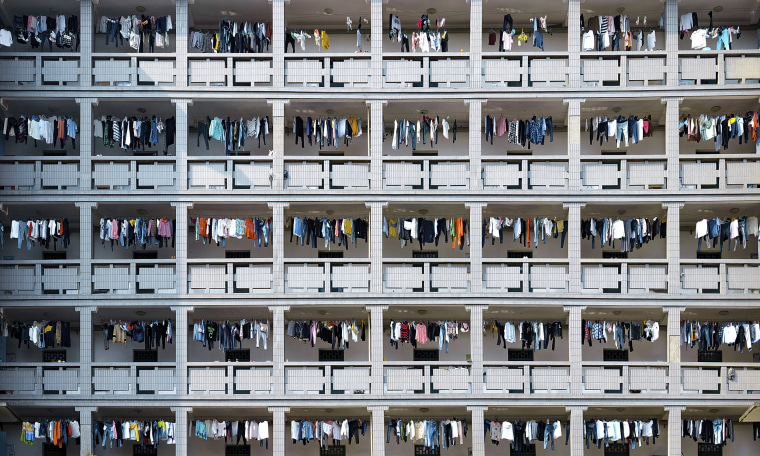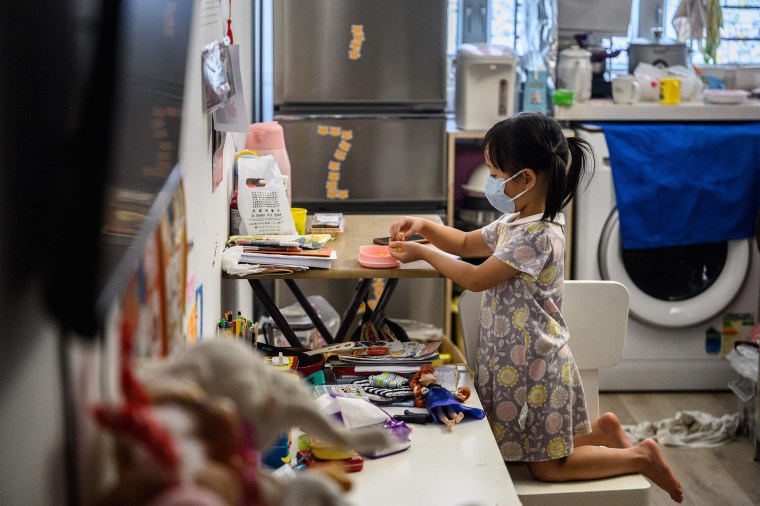"This is an opportunity to portray itself as a forward-thinking government that cares about its citizens," Austin Strange of University of Hong Kong said.
Sept. 5, 2021,
By Alexander Smith and Robbie Hu
Communist China has relentlessly pursued economic growth for decades, creating more billionaires than the United States, lifting 800 million people out of poverty, but leaving another 600 million to live on $150 a month.
Now, President Xi Jinping is planning what some experts say would be a dramatic about-face, trying to restructure Chinese society by cracking down on the country's newly minted super-rich and redistributing wealth more evenly among its population of 1.4 billion.
The drive involves plans to "regulate excessively high incomes" and "encourage high-income people and enterprises to return more to society," according to a readout of Xi’s comments at a meeting of the Chinese Communist Party by the state-run news agency Xinhua.
While his slogan of "common prosperity" was hardly new among Chinese leaders, Xi's speech last month was the starkest example of his apparent plan for a reshaped society.
Some experts believe that, for the party, there is a self-preservation rationale behind the goal of better income equality. For years the Communist Party has staked its legitimacy on growth that has outpaced that of any other major economy; now that that is slowing, it may feel it has to offer a new promise: equality.

Women look at bags at Louis Vuitton's flagship store Shanghai.
China Photos / Getty Images file
"China's government is aware that both domestic and international audiences are watching," said Austin Strange, an assistant professor of politics at the University of Hong Kong. "This is an opportunity to portray itself as a forward-thinking government that cares about its citizens, including those near the bottom of the wealth distribution."
As part of the Communist Party’s sweeping vision for the future, the government has enforced a regulatory crackdown against Chinese tech giants that sent Western financial markets into a spin.
But the efforts extend beyond the economy, including everything from limiting video gaming hours for minors, to trying to stamp out a fan culture that sees teenagers "blindly idolize celebrities," as the hawkish, party-controlled newspaper Global Times put it last week.
This message resonates with Cao Xinyin, 19, a college student in Beijing whose demographic — university-educated urbanite — the Communist Party is keen to keep on its side.
"Common prosperity means that everybody can live a high-quality life," she said. "People will live a healthier life, be better behaved, have a happier mood and will be more likely to pursue and realize their dreams."
Others aren't convinced, however.
Shaun Jiang, 28, the former owner of an education company in the southwestern city of Chengdu that recently closed, said common prosperity was little more than a political slogan, lacking “a clear roadmap and feasibility."
Either way, Xi’s attempts to control the market are unprecedented, according to Bill Bikales, a New York-based economist who spent years in China working on economic policy at various United Nations agencies.
"It's quite an extraordinary situation," he said. "What's surprising is the extent to which Xi thinks that the role of the market can be restricted, and restricted and restricted again."
"China's government is aware that both domestic and international audiences are watching," said Austin Strange, an assistant professor of politics at the University of Hong Kong. "This is an opportunity to portray itself as a forward-thinking government that cares about its citizens, including those near the bottom of the wealth distribution."
As part of the Communist Party’s sweeping vision for the future, the government has enforced a regulatory crackdown against Chinese tech giants that sent Western financial markets into a spin.
But the efforts extend beyond the economy, including everything from limiting video gaming hours for minors, to trying to stamp out a fan culture that sees teenagers "blindly idolize celebrities," as the hawkish, party-controlled newspaper Global Times put it last week.
This message resonates with Cao Xinyin, 19, a college student in Beijing whose demographic — university-educated urbanite — the Communist Party is keen to keep on its side.
"Common prosperity means that everybody can live a high-quality life," she said. "People will live a healthier life, be better behaved, have a happier mood and will be more likely to pursue and realize their dreams."
Others aren't convinced, however.
Shaun Jiang, 28, the former owner of an education company in the southwestern city of Chengdu that recently closed, said common prosperity was little more than a political slogan, lacking “a clear roadmap and feasibility."
Either way, Xi’s attempts to control the market are unprecedented, according to Bill Bikales, a New York-based economist who spent years in China working on economic policy at various United Nations agencies.
"It's quite an extraordinary situation," he said. "What's surprising is the extent to which Xi thinks that the role of the market can be restricted, and restricted and restricted again."
Political legitimacy at stake
Xi’s latest effort at state intervention might seem unsurprising for a one-party communist state. But since the 1970s, China has turned away from the Marxist zeal of former Chairman Mao Zedong and embraced reforms that opened up its economy and helped transform it into the global powerhouse of today.

An apartment building in Chongqing, the largest municipality in southwest China
.Zhou Zhiyong / AP file
More than 800 million people have been lifted out of extreme poverty since 1978, according to the World Bank, and more than half the population is now considered middle class. As of last year, there were 1,058 billionaires living in China compared with 696 in the U.S., according to the Hurun Report, a Shanghai-based organization that tracks China's wealthy population.
But although forecasts predict China's economy could overtake the U.S. in size as early as 2028, the country also has one of the highest levels of income inequality of any major world economy.
Some 600 million people — almost twice the U.S. population — are still living on the equivalent of about $150 a month, Chinese Premier Li Keqiang said last year.
"The wealth disparity has been quite serious in China," said Jiangnan Zhu, an associate professor of politics at the University of Hong Kong.
China was the only major economy that expanded last year, having largely eliminated the coronavirus after it was first detected there in late 2019. But in recent years there has been an overall slowdown in the country's stratospheric economic growth, which had been a "crucial pillar of the Chinese Communist Party’s political legitimacy," according to Strange at the University of Hong Kong.
Now that "the era of breakneck economic development is over," said Ryan Hass, a senior fellow at the Washington think tank Brookings Institution, "the Chinese leadership is shifting its focus toward improving quality-of-life issues as a new source of performance legitimacy."
Meanwhile, Beijing is under growing criticism from abroad over a wide range of issues, including its increasing military activity around Taiwan, tightening grip on Hong Kong and treatment of Uyghur Muslims, which the U.S. and others have described as genocide.
More than 800 million people have been lifted out of extreme poverty since 1978, according to the World Bank, and more than half the population is now considered middle class. As of last year, there were 1,058 billionaires living in China compared with 696 in the U.S., according to the Hurun Report, a Shanghai-based organization that tracks China's wealthy population.
But although forecasts predict China's economy could overtake the U.S. in size as early as 2028, the country also has one of the highest levels of income inequality of any major world economy.
Some 600 million people — almost twice the U.S. population — are still living on the equivalent of about $150 a month, Chinese Premier Li Keqiang said last year.
"The wealth disparity has been quite serious in China," said Jiangnan Zhu, an associate professor of politics at the University of Hong Kong.
China was the only major economy that expanded last year, having largely eliminated the coronavirus after it was first detected there in late 2019. But in recent years there has been an overall slowdown in the country's stratospheric economic growth, which had been a "crucial pillar of the Chinese Communist Party’s political legitimacy," according to Strange at the University of Hong Kong.
Now that "the era of breakneck economic development is over," said Ryan Hass, a senior fellow at the Washington think tank Brookings Institution, "the Chinese leadership is shifting its focus toward improving quality-of-life issues as a new source of performance legitimacy."
Meanwhile, Beijing is under growing criticism from abroad over a wide range of issues, including its increasing military activity around Taiwan, tightening grip on Hong Kong and treatment of Uyghur Muslims, which the U.S. and others have described as genocide.

A child eats a snack in her temporary 290 square-foot studio apartment in Hong Kong. Squeezed into the tiny temporary apartment, her family struggles to make ends meet in the notoriously unequal city.
Anthony Wallace / AFP via Getty Images
Some tech giants have responded to the government's regulatory crackdown by promising cash for philanthropic social programs. One of China's largest companies, Tencent Holdings Ltd., has pledged some $15 billion for a raft of initiatives, covering everything from the environment to education and rural reform to providing technological assistance for senior citizens.
Tencent said the move was a direct response to "China's wealth redistribution campaign."
Alibaba Group Holding Ltd., another Chinese tech giant, pledged a similar amount on Thursday.
Along with a revamped taxation and welfare system, Xi may be planning to use these types of large charitable donations as a central driver for his reforms, said Vivian Zhan, an associate professor of politics at the Chinese University of Hong Kong.
The Communist Party has "many policy tools to regulate big companies and mobilize resources from them for redistribution and other policy goals," she said.
But the common prosperity drive still faces other challenges such as corruption, the eradication of which has been the focus of a yearslong campaign by Xi. More than 60 percent of Chinese people still believe corruption is a big problem, according to Transparency International, a nonprofit organization based in Berlin.
"Common prosperity is a good idea, nice to hear but difficult to realize," said Qin Guiying, 52, who used to work as a farmer in Sichuan province but now works at a car wash in Beijing.
"The main problem is corruption of local officials," she added. "I think the rich people will remain rich, while the poor will remain poor because of corruption."
Some tech giants have responded to the government's regulatory crackdown by promising cash for philanthropic social programs. One of China's largest companies, Tencent Holdings Ltd., has pledged some $15 billion for a raft of initiatives, covering everything from the environment to education and rural reform to providing technological assistance for senior citizens.
Tencent said the move was a direct response to "China's wealth redistribution campaign."
Alibaba Group Holding Ltd., another Chinese tech giant, pledged a similar amount on Thursday.
Along with a revamped taxation and welfare system, Xi may be planning to use these types of large charitable donations as a central driver for his reforms, said Vivian Zhan, an associate professor of politics at the Chinese University of Hong Kong.
The Communist Party has "many policy tools to regulate big companies and mobilize resources from them for redistribution and other policy goals," she said.
But the common prosperity drive still faces other challenges such as corruption, the eradication of which has been the focus of a yearslong campaign by Xi. More than 60 percent of Chinese people still believe corruption is a big problem, according to Transparency International, a nonprofit organization based in Berlin.
"Common prosperity is a good idea, nice to hear but difficult to realize," said Qin Guiying, 52, who used to work as a farmer in Sichuan province but now works at a car wash in Beijing.
"The main problem is corruption of local officials," she added. "I think the rich people will remain rich, while the poor will remain poor because of corruption."
No comments:
Post a Comment